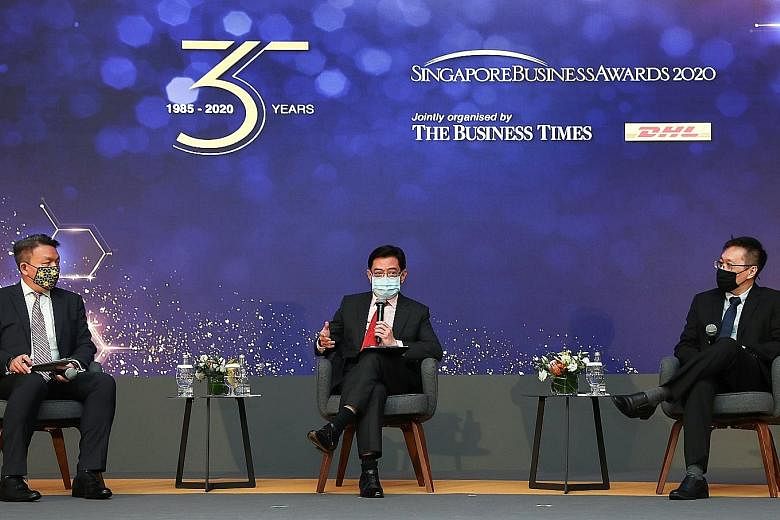Managing the pandemic remains Singapore's first priority, even as economic activities gradually resume, said Deputy Prime Minister Heng Swee Keat yesterday.
Pointing at how a resurgence in Covid-19 cases in other countries has posed difficulties for their economic recovery, he said the question of whether to save lives or livelihoods amid the pandemic is not binary.
"The better we are able to manage the pandemic, the better we are able to protect jobs," he said.
This also sets the pandemic apart from past crises such as the 1997 Asian financial crisis and the 2007-09 global financial crisis, said Mr Heng, who is also Finance Minister and Coordinating Minister for Economic Policies.
While all the crises have sent sudden shocks to the economy, the big difference in the current recession is that it has been triggered by the pandemic, so Singapore's economic trajectory depends critically on its ability to manage the virus outbreak, he said.
Mr Heng was speaking at a panel discussion of the 35th edition of the Singapore Business Awards, an annual event jointly organised by The Business Times and DHL Express Singapore.
The event, held at the Singapore Press Holdings' News Centre auditorium, was live-streamed online to a few hundred participants.
Mr Heng spelt out a number of challenges Singapore has to confront in the wake of Covid-19.
While its gross domestic product (GDP) is projected to grow by 4 per cent to 6 per cent next year, growth rates will remain below 2019 levels by the end of next year, as the projected contraction in the economy of between 6 per cent and 6.5 per cent this year means the economy will start off from a lower base.
"It is going to be still quite a stressful period, so we would have to deal with that," Mr Heng told his fellow panellists, DHL Express Singapore managing director Christopher Ong and Business Times editor Wong Wei Kong.
Singapore is also facing greater geopolitical uncertainty, he said.
While US President-elect Joe Biden will hopefully shape a new course for the world, the "fundamental uncertainties" that have been articulated in the era of President Donald Trump's leadership are unlikely to go away.
"Both the Democrats and Republicans will have significant differences to deal with, and around the world, there will also be significant differences to deal with," he said, adding that Covid-19 has made the management of such ideological differences far more difficult.
Still, he hopes global leaders will appreciate that people are now living in an inter-connected and interdependent world where many issues require global cooperation, like the need to ensure secure supply chains during Covid-19.
Asked by participants about Singapore's strategy amid the US-China trade war, Mr Heng said it remains the same: Be friends with all nations and continue to be a strong supporter of multilateral institutions.
"Singapore is too small to threaten anybody... sticking to global rules and norms is very important for us. If everyone (does it), and we are not forced to take sides, it will allow us to accommodate people and companies from all over the world who want to use us as a base," said Mr Heng.
Asked by Mr Wong how Singapore can manage the tension between the demand for talent as well as manpower and the desire for a stronger Singaporean core, Mr Heng said managing the duality will always be a part of the country's policy framework. "I'll say that it is not contradictory," he added.
For instance, growing up in a multicultural and multiracial society will give Singaporeans an edge, equipping them with a greater sensitivity to the cultures of different people. This will enable them to adapt and do business with people around the world.
Also, if Singaporeans remain open to having some of the world's best talents here, they will benefit from the process of osmosis when working with them, he added.
At the awards, Mr Forrest Li, founder and group chief executive of tech giant Sea, was named Businessman of the Year 2019/2020.
The naturalised Singapore citizen, who is from Tianjin in China, paid tribute to Singapore's role in Sea's success, recalling that he was deep in debt when he arrived here 15 years ago.
"There is a stereotype out there that businessmen come to places like Singapore only after they have found success elsewhere.
"That is not my story... Long before I had any success, (the Singaporean community) made me feel welcome, and let me and my family make our home here," he said.


